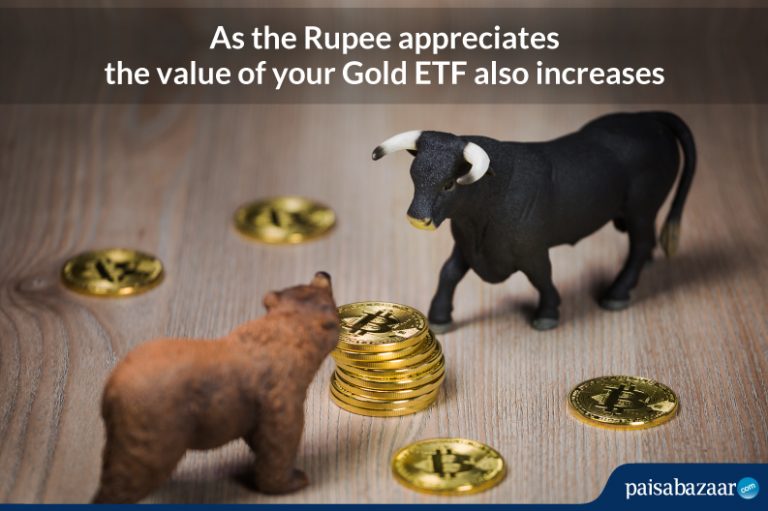
Gold, a staple of the Indian upper class is a commodity like no other in the Indian retail market. Even in recession, buying and selling gold has continued across the length and breadth of India and there is no evidence which suggests this won’t continue. To serve this passion and dedication which Indians carry towards gold, the government has presented the people with Gold ETFs. A Gold Exchange Traded Fund (ETF) is an investment fund which invests money in gold bullion and gold producing firms by trading their Gold ETF units on the stock exchange, just like one may trade stocks.
Since Gold ETF units in India can be bought through open-ended mutual funds, money collected through trading of the Gold ETF units is usually invested further in gold only. Experts believe that returns from the gold ETF units are close to the earnings one might make through buying and selling of physical gold.
With Gold ETF units you are investing in gold listed at a specific index of a particular stock exchange. The Gold Exchange traded fund on the stock exchange, which are selling you the gold ETF units, are passively managed funds and through them you are, in a way, investing in a portfolio which contains multitude of companies. Through Gold Exchange Traded Funds you can invest in Gold price Exchange Traded Funds and Gold stock Exchange Traded Funds. Gold stock ETFs are associated with companies whose business is gold mining and other related activities and Gold price ETFs let you invest in companies which deal in Gold price index.
Benefits of trading with Gold ETFs
Trading with Gold Exchange Traded Funds and buying and selling their ETF units have many advantages when compared to buying and selling physical gold. Read on below for the benefits which they offer:
- You won’t have to give any making charges when buying gold ETF units. This doesn’t hold true for physical gold jewellery, coins, bars and other such material things.
- Gold ETF units issued to you are linked to your credentials (KYCs) and so you need not worry about them being stolen unlike physical gold which you need to keep in a bank locker and then pay the locker fees to the bank too. Also, with Gold ETF units, you need not worry about the purity of gold which you will have to confirm through a hallmark when buying physical gold.
- You can easily sell your gold ETF units whenever you want however selling off your physical gold is a tedious process which requires you to visit a trusted jeweller’s shop where you need to get all the weighing done and then negotiate with the jeweller to finalize the sale process. It is known that the jeweller/buyer will never give you the true value of the physical gold and will deduct a minimal amount when you resell them your gold however this is not the case with Gold ETF units.
- Currently the Indian economy is gaining up on the world market. As the Rupee’s position in the market rises and the Dollar position weakens, the value of the Gold ETF you own will rise.
- With Gold ETFs, you will have greater liquidity compared to the liquidity which physical gold gives you. Purchase and resale of Gold ETFs is pretty easy. Gold ETFs are an investment instrument for all kinds of tenures, whether, short term, medium term or long term.
- Physical Gold’s price varies at each jeweller’s shop. However, that is not the case with Gold ETFs. The price is same wherever you look.
- Gold ETFs are more tax efficient than physical gold. They are also available in small denominations. When out to buy physical gold, you cannot ask for one gram of gold and in any case, whatever physical gold you buy you will be liable to pay making charges however one Gold ETF unit is equivalent to one gram of gold. No worries about price variation, quality, purity, weight and units of purchase.
- Gold ETFs are accepted as collateral for loans.
There can be some downsides to buying Gold ETF units too. These include:
- If you have set your mind on buying a piece of gold jewellery or gold coin, then buying Gold ETF units won’t solve the purpose. An ETF unit may be a replacement of the physical gold’s value but it isn’t a replacement of its beauty.
- Gold ETF units can only be redeemed in cash and not gold. Also, while holding Gold ETF unit is safer compared to physical gold but to trade them you will have to open a Demat (dematerialised) account and pay the account’s annual maintenance too.
- Also you need to check the performance of the gold ETF unit before investing. This is not the case when you go to buy physical gold.
Please also note that the tax methodology followed for Gold ETF units is similar to that of debt funds. Both short term and long term capital gains tax are applicable on Gold ETF units. If you sell your ETF units before 3 years of holding and earn a profit, that profit will be treated as a ‘capital gain’ and your ‘Income From Other Sources’ and will be added in your yearly income for tax calculation purposes. Additionally, if you sell your ETF units after holding them for 3 years then the profit you make on that sale will be charged at 20% with indexation benefits. However, you can save taxes on these capital gains too by considering investment under section 54 and 54EC. Conclusively, Gold ETFs are easier to procure and deposit securely when compared to physical gold and they should definitely be a part of an investor’s portfolio owing to their aforementioned advantages.